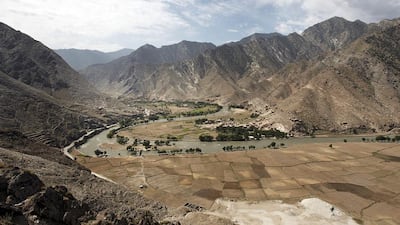ASADABAD, Afghanistan // For several days, the Taliban used rocks to block a main road leading from Nari to Asadabad in eastern Afghanistan. A heavy machine gun was stationed on an overlooking mountain in case anyone still tried to pass.
People who described the incident from last month said it was a show of power that ended when residents cleared the route themselves – with the permission of the insurgents – rather than continue waiting for help from the security forces.
In a series of interviews with The National, they cited this as further proof that the government is losing its grip here, conceding territory and public support in a region where US troops spent years struggling to subdue the Taliban.
Asadabad is the capital of Kunar, a province of stunning vistas on the border with Pakistan.
The Taliban now dominate the surrounding countryside and all but control several districts, according to residents, elders and a politician.
Nato has said over the years that other militant groups including Hizb-e-Islami, the Pakistani Taliban, Lashkar-e-Taiba and remnants of Al Qaeda are active locally.
While some of the claims made are impossible to verify, the sense of anxiety in Asadabad is clear as the weather gets warmer and the summer fighting season gets under way.
Mohammed Rafi, a taxi driver, said: “The Taliban are very strong. If they want to stop a car and take a passenger, they can easily. We don’t feel like we have a government or someone we can complain to about the situation. The police and army are nothing.”
With its mountainous terrain, Kunar has long had a reputation as an insurgent stronghold, dating back to the anti-communist resistance of the 1980s. The population is predominantly ethnic Pashtun and, unusually for Afghanistan, contains a relatively large number of Salafi Muslims.
Despite its remote location, Nato regards the eastern province as an infiltration route for militants heading deep into the country from Pakistan and some of the most intense combat of the past decade took place here, most notoriously in the Korengal valley.
There is no obvious desire among the people for American troops to return to Kunar. But with most foreign soldiers now gone from Afghanistan, the war is entering a new phase that has seen violence escalate across the country.
Before the road leading from Nari district to Asadabad was blocked, insurgents also obstructed another road connecting Asadabad and the district of Dangam, where heavy fighting had taken place during the winter.
“If this continues, obviously it’s a big problem,” said Wazhma Safi, a local MP. “On its own it shows the strength of the Taliban.”
While Taliban offensives in the north of the country have grabbed media attention in recent weeks, Ms Safi said Asadabad was not safe either. Speaking from Kabul, she said most of Kunar was now “under threat” and the province was in danger of being “lost” alongside large parts of eastern and southern Afghanistan.
Residents of Asadabad described how rocket and mortar attacks on the town have become more common, though they are not a daily occurrence.
They said the insurgents have relative freedom to do as they please outside the capital.
As if to emphasise this, an elder excitedly pointed to the headlights of a vehicle moving across a nearby mountain one night, saying that it was an area in which the Taliban operated.
The confidence of the insurgents appears to have been boosted by administrative failings.
Many senior officials in Kunar are still waiting to hear from Kabul if they will be holding their positions on a permanent basis as different factions within the central government wrangle over who should get important posts across the country. As a result, faith in the system is disappearing fast.
Haji Ziaullah, the director of Asadabad’s money changers council, estimated that businesses had lost 70 per cent of their trade due to the political uncertainty and growing insecurity.
“The Taliban can block a road any time,” he said. “The highway to Nuristan is always blocked and each day there is fighting. Don’t even ask me about the districts that are far away. The local government is so weak that if a checkpoint is under attack it will take a month for help to arrive.”
In January, the Taliban released a video via its website showing operations it had carried out in Kunar. The film included footage of Afghan soldiers captured in Nari.
More recently, the province’s chief of police, Abdul Habib Sayedkhili, survived a roadside bombing as he travelled between Kabul and Kunar on April 8.
The growing strength of the Taliban is not the only problem locals have to deal with.
Cross-border shelling by the Pakistan army in previous years has also caused widespread anger in Afghanistan. Then there is deforestation, with trees being illegally cut down and the timber smuggled out of the country – allegedly with the involvement of corrupt local officials.
“All the governments have been bad for us,” said Ajmal Malik, an employee of Asadabad municipality.
“Security was only good during the Taliban time. All the others have been the same – they haven’t done anything for us. We are not safe.”
foreign.desk@thenational.ae

